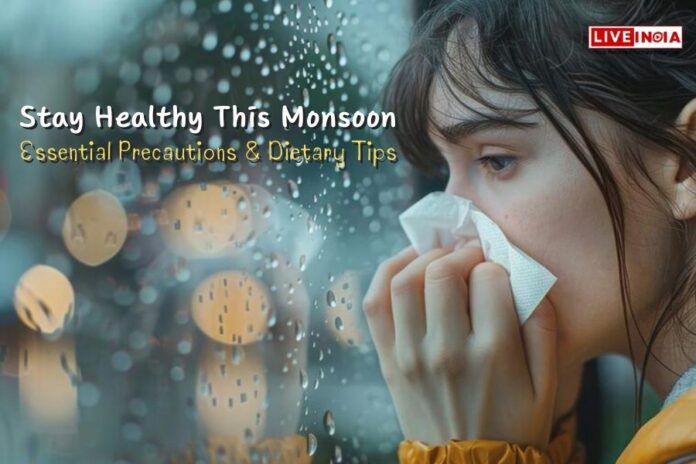The monsoon season in India brings much-needed relief from the scorching summer heat, but it also comes with its own set of challenges, particularly concerning health. The high humidity and constant rain can increase the risk of waterborne and foodborne illnesses. Here are some essential precautions to take during the monsoon season, along with dietary recommendations to keep you healthy.
Health Precautions
- Maintain Hygiene:
- Hand Washing: Regularly wash your hands with soap and water, especially before meals and after using the restroom.
- Sanitization: Use hand sanitizers when soap and water are not available.
- Water Safety:
- Boiled or Filtered Water: Always drink boiled or filtered water to prevent waterborne diseases like cholera, typhoid, and diarrhea.
- Avoid Stagnant Water: Ensure there is no stagnant water around your home as it can become a breeding ground for mosquitoes, leading to diseases like dengue and malaria.
- Protect from Mosquitoes:
- Use Mosquito Repellents: Apply mosquito repellents on exposed skin.
- Mosquito Nets: Use mosquito nets while sleeping.
- Wear Full-Sleeve Clothes: Opt for full-sleeve clothing to minimize skin exposure.
- Proper Ventilation:
- Air Circulation: Keep your home well-ventilated to prevent mold growth due to high humidity.
- Use Dehumidifiers: Consider using dehumidifiers to maintain indoor air quality.
Dietary Recommendations
What to Eat:
- Seasonal Fruits:
- Pears, Jamun, Litchi: These fruits are not only delicious but also help boost immunity.
- Bananas and Apples: These are safe and nutritious options during the monsoon.
- Vegetables:
- Gourds and Pumpkins: Rich in nutrients and easy to digest.
- Bitter Gourd (Karela): Known for its medicinal properties, it helps in digestion and detoxification.
- Spices and Herbs:
- Turmeric and Ginger: Known for their anti-inflammatory and immune-boosting properties.
- Garlic: Helps in improving immunity and fighting infections.
- Soups and Stews:
- Warm Broths: Keep you hydrated and are easy on the stomach.
- Herbal Teas: Such as ginger tea and tulsi tea, which can help boost immunity and fight off infections.
What to Avoid:
- Leafy Vegetables:
- Spinach, Cabbage, and Cauliflower: These can harbor dirt and germs due to the high moisture content, making them prone to contamination.
- Street Food:
- Fried Snacks and Chaat: These are often prepared in unhygienic conditions and can cause stomach infections.
- Ice Golas and Kulfi: These can be made from contaminated water and lead to severe illnesses.
- Seafood:
- Fish and Prawns: These can spoil quickly during the monsoon, increasing the risk of food poisoning.
- Raw Foods:
- Salads and Uncooked Meals: These can be contaminated easily. It’s better to eat steamed or boiled foods.
By following these precautions and dietary guidelines, you can enjoy the monsoon season while staying healthy and avoiding common ailments associated with this time of the year. Always prioritize hygiene, consume freshly prepared foods, and stay hydrated to keep monsoon-related health issues at bay.



